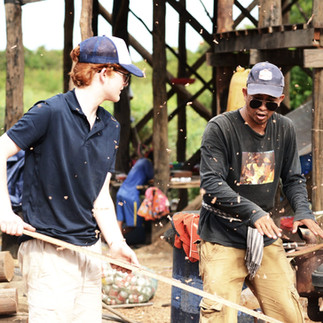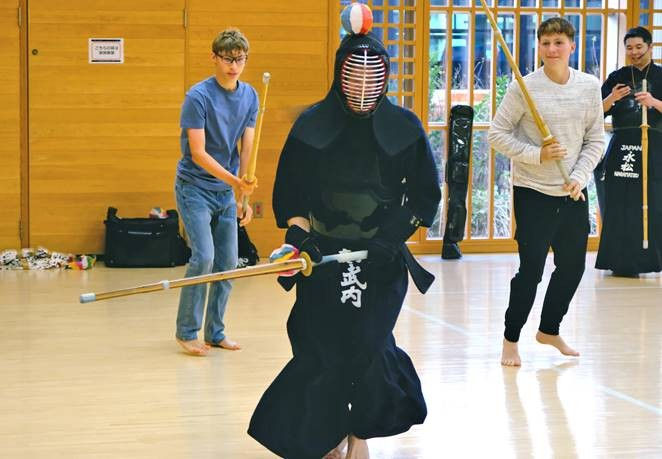Cambodian Service-Learning Trip (Kampong Kleng Province) 2023
- SEE Team

- Jul 31, 2023
- 3 min read
Updated: May 31
The students, along with the help of local trades people and enthusiastic village children, did an exemplary job in building the two dwellings. What made their achievements even more remarkable was that unbeknown to the village and most of the SEE staff overseeing the project, some of the students in the group possessed highly developed skills. These skills included frame construction, grinding, wood plaining, as well as carpentry and manual arts skills. This unexpected advantage helped the entire construction run smoothly, ensuring that the buildings were of high quality and will support the families and their children for many decades.
The initiative of involving students in service-learning experiences such as this, is part of the culture of many Australian schools. These programs aim to create positive changes for individuals, groups, and communities. By engaging in these carefully planned and well executed projects, students not only learn about and appreciate the challenges faced by communities experiencing poverty, but also develop skills of critical understanding, collaboration, and leadership. Overall, the success of this particular program, can be attributed to the highly motivated group of students who brought their skills and enthusiasm to the project, working alongside experienced tradespeople to make a meaningful and lasting impact in this community in Cambodia.
What makes a successful student community-building program?
In recent years, some non-governmental organisations have been understandably critical of the effort of well-meaning groups of students, who may have embarked on unsustainable projects, often spending very large sums of money and much effort on projects not required by the villages or indeed desired. With large numbers of schools visiting Asia, particularly Cambodia, to undertake community service activities, it is more important than ever to ensure that efforts go towards ethical, achievable, and sustainable projects.
The key to a successful project, particularly when it involves service-learning activities in communities, is to ensure that the efforts are well-planned, sustainable, and genuinely beneficial to the recipients. Here are the essential factors considered by SEE before we commence a project in this area:
Identify Genuine Needs: Before starting any project, it is crucial to identify the genuine needs of the community. Engage in thorough research and consultation with community leaders, government officials, and beneficiaries to understand their actual requirements and priorities.
Community Involvement and Consent: Involve the community from the beginning of the project. Seek their input, opinions, and consent to ensure that the project aligns with their desires and values. Projects imposed from outside without community involvement often end up being unsustainable and ineffective.
Sustainability and Longevity: A successful project should have a long-term impact on the community. It should be sustainable and capable of creating lasting benefits even after the initial implementation. Consider how the project will be maintained and supported once the student group leaves.
Partnerships and Collaboration: Collaborate with local organisations, NGOs, or government bodies that have experience in implementing similar projects. Their knowledge and understanding of the community’s needs can be invaluable in creating a successful initiative.
Avoid “Feel-Good” Activities: Ensure that the project is not merely a short-term, superficial activity that makes students feel good but has little real impact. The focus should be on addressing real issues and making a positive change in the community’s well-being.
Prioritise Remote and Underserved Areas: Concentrate on communities that are truly in need, even if they are located far from popular tourist destinations. These remote areas often lack access to resources and can benefit greatly from well-planned service projects.
Pre-Inspection and Evaluation: Before committing to a project, conduct pre-inspection trips and evaluations to assess the feasibility and suitability of the proposed initiative. This helps in understanding the on-ground realities and potential challenges.
Education and Reflection: Incorporate education and reflection components for students involved in the project. Help them understand the broader context of the community’s challenges and the importance of sustainable and respectful engagement.
Measure Impact: Define clear metrics and indicators to measure the project’s impact on the community. Regularly evaluate progress and adapt strategies as needed to ensure the project remains effective.
Cultural Sensitivity: Respect and understand the cultural norms and practices of the community. Work in a manner that does not impose foreign values but instead embraces the community’s cultural heritage.
Student Educational Experiences ensures all our staff, in particular our tour leaders and local managers, understand and are committed to these strategies. By following these guidelines, schools and organisations can ensure that their service-learning projects are meaningful, impactful, and respectful of the communities they aim to assist. This approach will lead to genuinely life-changing experiences for the students and real benefits for the communities involved.









